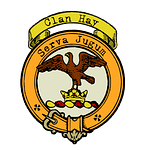Welcome back to "A Clan A Day Podcast," brought to you by bagtownclans.com. I'm your host, Colin MacDonald, and today we explore the fascinating history of Clan MacFarlane, a proud and storied Highland clan with deep ties to the ancient Earls of Lennox. Known for their bravery, loyalty, and occasionally their lawlessness, the MacFarlanes have a history that is as complex as the Highland landscapes they called home.
The origins of Clan MacFarlane are rooted in the medieval Lennox earldom. According to historian William Skene, Clan MacFarlane, or "Clann Phàrlain," can trace its lineage back to Gilchrist, a younger brother of Maldowen, the 3rd Earl of Lennox. In the early 13th century, Maldowen granted Gilchrist the lands of Arrochar, which became the clan's traditional home for centuries. The family name, MacFarlane, comes from Gilchrist’s grandson, Parlan (or Bartholomew), whose descendants continued to hold these lands until the 18th century.
Although the MacFarlanes descended from noble stock, the origins of the Lennox earls themselves are a bit murky. Some believe the family to have Anglo-Saxon roots, tracing their lineage to Arkil, a Northumbrian chief who fled to Scotland during the Norman Conquest. Others suggest that the Lennox line had Gaelic origins. Regardless of their precise beginnings, the MacFarlanes were firmly established as vassals of the Earls of Lennox, playing a significant role in the region’s history.
The MacFarlanes quickly earned a reputation for their martial prowess. They fought in some of Scotland's most significant battles, including the Wars of Scottish Independence alongside the Bruce and Wallace, although their participation is more legend than confirmed fact. During the 16th century, Duncan MacFarlane led 300 clansmen in support of Matthew Stewart, 4th Earl of Lennox, at the Battle of Glasgow Muir in 1544. Though the battle ended in defeat, the MacFarlanes showed their loyalty to the Lennox earls, a relationship that would endure for generations.
One of the clan's most famous moments came in 1568 during the Battle of Langside, which marked the downfall of Mary, Queen of Scots. The MacFarlanes, under Andrew MacFarlane, played a pivotal role by flanking the Queen’s forces, causing chaos and contributing to their defeat. For this valor, Andrew was granted the right to bear the crest of a "demi-savage" holding a sheaf of arrows and pointing to an imperial crown, along with the motto "This I'll Defend." The symbolism in this crest captured the clan’s fierce loyalty to the Crown of Scotland.
However, the MacFarlanes were also known for their more rebellious side. During this same period, the clan became notorious for cattle raiding, a practice so frequent that the full moon became known locally as "MacFarlane’s Lantern," as it illuminated their nocturnal activities. Their raids frequently targeted neighboring clans such as the Colquhouns and the Buchanans, leading to a series of bloody feuds. These raids and feuds eventually drew the attention of the Scottish government, and in 1594, the MacFarlanes were officially denounced for their acts of "theft, robbery, murder, and tyranny."
Despite their turbulent reputation, the MacFarlanes remained loyal to the Stewart monarchs, including during the English Civil Wars. Walter MacFarlane, chief of the clan during this period, supported King Charles I. His loyalty cost him dearly; his castle at Inveruglas was burned down by Cromwell’s forces, and he was heavily fined. Yet, the MacFarlanes stood firm in their support of the royal cause.
As the 18th century approached, however, the fortunes of Clan MacFarlane began to wane. The financial pressures of the time led to the sale of their ancestral lands in Arrochar in 1785. The chief emigrated to North America, and the clan's leadership fell into disarray. By the early 19th century, the title of MacFarlane chief had become dormant, and the clan dispersed, with many members emigrating to Ireland and later to the Americas.
Even though the clan no longer holds its ancestral lands, the legacy of the MacFarlanes endures. They are remembered for their fierce independence, their loyalty to the Lennox earls, and their readiness to defend their heritage. The Clan MacFarlane Society, founded in the late 19th century, works to preserve this legacy and reconnect MacFarlane descendants around the world. Their ancient battle cry, "Loch Sloidh," still echoes through the Highlands, symbolizing the indomitable spirit of this proud clan.
Thank you for joining us on this exploration of Clan MacFarlane. Be sure to tune in tomorrow for another episode of "A Clan A Day Podcast." I'm Colin MacDonald, and as always, Go n-éirí an bóthar leat!











